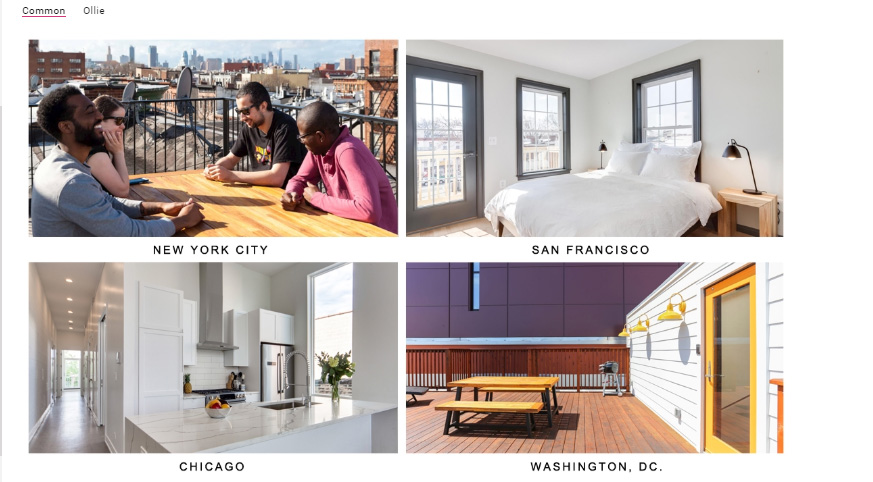Co-living Craze
Communal housing is no longer for hippies but for "professional hipsters". Re-branded for millennials, freelancers, and start-up entrepreneurs, co-living brings together like-minded people keen on collaboration, socializing, and connecting under one roof. Companies like Common and Ollie not only offer thoughtfully designed micro suites, apartments and rooms to rent, they offer a lifestyle of convenience where members can transfer between their buildings in cities across the country. This residential flexibility caters directly to the digital nomadic lifestyle of start-up entrepreneurs building their businesses from their laptops as they travel wherever opportunity takes them.
New real estate developments are catering to the every demand of the modern urban citizen, a fitness room is not enough. The idea of community-centric housing appeals to people attracted to the connected living experience. High rents are forcing millennials ( including married couples) to look for apartments that offer more value in amenity extras that make life easier. New developments like Urby are built to organically connect the residents, from the community garden in the center, to the café, bodega, and a group kitchen built for events like residents cooking classes.
A New Way of Living
Co-living is the antidote to our increasingly isolated digital existence, aiding friendships to be made over the pool table and encouraging residents to participate in community programming. At The Collective Old Oak in West London, UK, the world’s largest co-living complex, a weekly ‘Game of Thrones’ night gathers a crowd of young professionals into bean bags in the building's movie theater. Residents can also spend their time in the library, garden hangout, co-working office or cafe. Finding reasons to leave can often be hard to find.
Multi-City Options
It may be early days for the co-living model but it’s flexible living options are proving popular, with developments springing up at an increasing rate. All-inclusive conveniences are offered at the five Ollie complexes on both the West and East Coast of the US. Ollie competitor Common has a transfer system that allows its residents to move to a room at any of their locations with only two weeks notice.

Worldwide Reach
Moving in with strangers, let alone sharing a bathroom, may not be for everyone, but when it opens the door to living in the jungle in Thailand or on the beach in Spain it's hard to say no. Companies like Cowoli serve as a fantastic directory of co-working and co-living spaces from around the word making it easy for digital nomads to find places to sleep, work and network in Bali, Japan, UK, Singapore, Seoul, Barcelona and across the United States.
Start-Up Lifestyle
Co-working space power player WeWork is flexing muscle in the co-living space with WeLive, with locations in New York and Crystal City, DC. WeLive is an extension of WeWork's office space, offering the same flexible month-to-month membership model, doing away with the broker fees, guarantors and the unrealistic 40x rent proof that traditional leases require.
The nature of the digital nomad is reflected in the hotel-like decor and comfort these shared residences provide. Most offer daily housekeeping, fully furnished units, with everything from linen and towels to kitchen utensils and a 24 hour ‘community’ concierge. Entrepreneurs and free-lancers living with other like-minded individuals benefit from collaborative efforts, swapping skills, sharing knowledge and most important, friendship.
- HeatherPicquot
